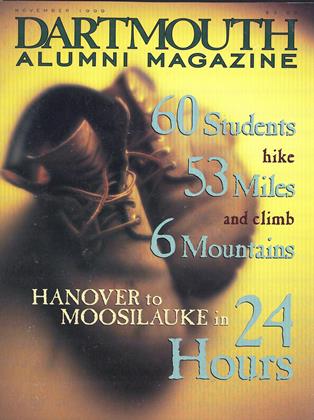First The New Yorker runs a 23,000-word report on the Microsoft lawsuit, then The New York Times reports on the report. In fact, much of the nation's media have been treating this watershed anti-trust story like a Shakespearean epic. Bill Gates as King Lear. Maybe Macbeth. Certainly not Hamlet. It happens that two of the supporting players in the Bill Gates saga are Dartmouth alumni. Closest to Gates, and to Microsoft, is the corporation's long-time general counsel, William H. Neukom '64, who New Yorker illustrator Philip Burke limned as a white-haired, bow-tied, virtual father figure to the billionaire computer genius (above, lower right). Author Ken Auletta relates that Gates's real father said to his friend Bill Neukom (also a Dartmouth Trustee) a fewyears back, "My kid's bringing his little business up to Seattle. Would you take a shot at looking out for him?" The second Dartmouth alum with an important part in the juryless trial is federal judge Thomas Penfield Jackson '5B (above, upper left), who is presiding. A Reagan appointee and therefore supposedly partial to bigbusiness interests, he's the same judge who in December 1997 issued an order (later overruled on appeal) forbidding Microsoft to "bundle" its Internet Explorer with its Windows operating system. Has Microsoft indeed restrained trade or monopolized commerce? Stay tuned.
Recently reporting at length a not-so-big-business story, The New York Times told how a "Small Vermont Publisher Succeeds With Guides for a Simpler Life." This is Chelsea Green Publishing in White River Junction, where Jim Schley '79 is the editor in chief. Probably its biggest hit is The Straw Bale House, which has sold 100,000 copies since it was first published five years ago, despite the fact that there are no more than a couple of thousand of these inexpensive, energy-efficient, forest-saving houses in the country. Even if readers don't build them, says Schley, "they're more likely to support the issues."
The cover story in the August issue of The Atlantic Monthly was entitled "A Politics for Generation X," and subtitled "The agenda that Xers care about will define the next center of American politics." The piece was the work of Ted Halstead '90, whom The Atlantic described as "a venture capitalist of talent and ideas." This because of his job as president and CEO of the New America Foundation, a Halstead invention designed to help launch careers for young journalists interested in politics and public policy. Halstead's theory: while today's post-Baby Boom generation of twenty-somethings is for the most part politically disengaged, a new agenda of "balanced-budget populism" and "social investment" just might turn his generation into activists.
 View Full Issue
View Full Issue
More From This Issue
-
 Cover Story
Cover StoryHanover to Moosilauke or Bust
November 1999 By Jon Waldman ’00 -
 Feature
FeatureMiraculously Builded
November 1999 By David M. Shribman ’76 -
 Feature
FeatureBadly, He Wrote
November 1999 By Rich Barlow ’81 -
 Feature
FeatureWebster in the Raw
November 1999 -
 SYLLABUS
SYLLABUSThe Undead
November 1999 By Kathleen Burge ’89 -
 PRESIDENTIAL RANGE
PRESIDENTIAL RANGEThe Numbers Game
November 1999 By President James Wright







